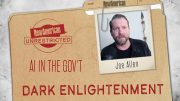A former British ambassador who is now an operative for WikiLeaks says that the leaked DNC and Clinton campaign e-mails and documents were not hacked by the Russian government, as claimed by the CIA. In fact, he says the leaked documents were not hacked at all. “The source had legal access to the information. The documents came from inside leaks, not hacks,” former ambassador Craig Murray said in a recent interview with the Daily Mail.
Murray (shown) was the British ambassador to Uzbekistan from 2002 to 2004, when he was removed from his post for speaking out against the use of torture to obtain intelligence on Islamic terrorism. Murray said the practice was immoral and illegal and that the intelligence gathered was unreliable, describing it as “selling our souls for dross.”
After leaving his post, Murray continued to expose illegal and immoral operations that are part and parcel of the war on terror. In 2006, he published documents on his website showing that CIA proxies routinely torture suspects and use the dubious information obtained from the torture as propaganda to continue the war on terror. He was ordered by the British Treasury Solicitor’s office to remove the documents by July 10, 2006 or face an injunction from the High Court. Many of the readers of his website responded by copying the documents and mirroring them on other websites. The documents were never taken down and no legal action was ever brought.
Since 2012, Murray has been an operative with WikiLeaks, where he continues his fight against the war on terror. In an interview with the Daily Mail on Tuesday, he said that the CIA claim that Russian government-sponsored hackers were the source of the leaked DNC and Clinton campaign documents published by WikiLeaks is false. “Neither of [the leaks] came from the Russians,” Murray said. “The source had legal access to the information. The documents came from inside leaks, not hacks.” And Murray would know, since he claims that he is the one who received the documents from someone working with the people responsible for obtaining them.
According to the Daily Mail:
Murray said he retrieved the package from a source during a clandestine meeting in a wooded area near American University, in northwest D.C. He said the individual he met with was not the original person who obtained the information, but an intermediary.
To protect the identity of the sources, he refused to say who they were, where they worked, or how they had “legal access” to the documents. But he described them as being motivated by “disgust at the corruption of the Clinton Foundation and the tilting of the primary election playing field against Bernie Sanders.”
He expressed frustration at the CIA’s false claims, saying, “I don’t understand why the CIA would say the information came from Russian hackers when they must know that isn’t true.” He added, “Regardless of whether the Russians hacked into the DNC, the documents WikiLeaks published did not come from that.”
While Murray’s claims cannot be independently verified (because he will not name the sources), they fit very neatly with previous statements from Julian Assange, WikiLeaks’ founder and public face. In an interview with John Pilger in November, Assange said, “Hillary Clinton has stated multiple times, falsely, that 17 US intelligence agencies had assessed that Russia was the source of our publications. That’s false — we can say that the Russian government is not the source.”
When Assange made that claim, many questioned how he could say that with such certainty since WikiLeaks boasts of zero-knowledge end-to-end encryption that prevents even those who publish the leaked information from knowing its source. But if the leaks were delivered to WikiLeaks in person, rather than over that secured Internet portal, then this would explain how Assange and Murray could know that the sources were not Russian and had “legal access” to the e-mails and documents.
This, of course, flies in the face of CIA claims that the agency had “identified individuals with connections to the Russian government who provided WikiLeaks with thousands of hacked emails” and that “Russia’s goal here was to favor one candidate over the other, to help Trump get elected.” Given the choice to believe either WikiLeaks or the CIA, the choice is not a difficult one for any objective thinker. As The New American observed Wednesday, the CIA does not have a stellar record of honesty or accuracy:
There are good reasons to doubt that the CIA assessment is based in anything but political motivation. In fact, retired Army intelligence officer Tony Shaffer made exactly that point in a December 12 interview with WMAL radio. Shaffer said the assessment was “purely political” and was an act of “loyalty to President Obama.” He added, “It’s about undermining Trump, that’s what it is. It’s called ‘information operations,’ ‘information warfare,’ and that’s what I believe is going on.” It is important to remember that this would not be the first time the CIA has run a disinformation campaign to put a preferred leader in power. Disinformation is the agency’s trade-craft. The Trump transition team echoed similar sentiments in a short statement issued on December 9, saying of the CIA, “These are the same people that said Saddam Hussein had weapons of mass destruction.”
On the other hand, during the 10 years that it has provided a safe platform for whistleblowers, WikiLeaks has published millions of documents, the authenticity of which has not been refuted. It has also scooped many mainstream media outlets, which have — in turn — used the WikiLeaks releases as source material for their own reporting.
Photo: Former British Ambassador Craig Murray





